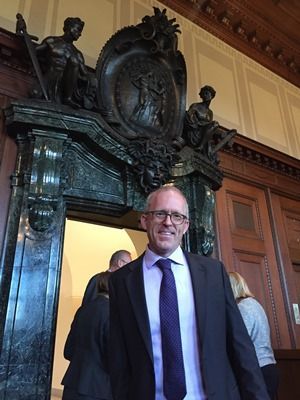
Professor Darryl Robinson is often called upon to speak about crimes against humanity to academics and students around the world. On Sept. 16, he discussed the topic at a retreat for the judges of the Kosovo Specialist Chambers (KSC). The event was at the Nuremberg Palace of Justice, in the courtroom where the Nuremberg trials were held.
Created in a partnership with the European Union, the KSC are part of the judicial system of Kosovo. The Chambers, established by a constitutional amendment, have a mandate over crimes against humanity, war crimes and other crimes committed during the Kosovo conflict. The Chambers were created in response to reports of unaddressed crimes against Serbians and Albanian Kosovars, including detentions, disappearances, and trafficking in human organs. Having a seat in The Hague, the KSC are staffed with international judges and prosecutors.
The retreat allowed judges to familiarize themselves and exchange views on some contemporary legal issues. “I spoke about current controversies in the law of crimes against humanity,” says Robinson, an expert whose work on the subject has influenced international instruments and jurisprudence, and who continues to explore the outer limits of these crimes in an ongoing SSHRC-funded research project. “I showed how different legal approaches to these controversies actually reflect different underlying ways of thinking about the crimes.
“These judges were an exceptionally highly qualified group,” he adds. “Three of them were involved in groundbreaking international decisions, and two of them are leading scholars in the topic. There were many different viewpoints. We had a lively but collegial and friendly discussion that really helped clarify the issues and the stakes.”
The historic venue is now home of the International Nuremberg Principles Academy, a forum for capacity-building and knowledge exchange between judges and practitioners of various countries. It also holds thematic meetings of experts on topics like cooperation in sexual violence investigations, hate speech, deterrence, refugees as witnesses, and Islam and international criminal law.
“The venue reminds us that every community whose members have ever been prosecuted for international crimes initially perceived that scrutiny as unfair,” says Robinson. “This has happened in all regions and all latitudes of the world. Yet, decades later, many of the norms of international justice are internalized in those communities. Germany is a prime example. Most Germans were initially skeptical of Nuremberg, but today Germany is deeply committed to the Nuremberg principles.
“The retreat gave me a sense of optimism,” he reflects. “Right now the media and academic discourse focuses on the many stumbles and challenges for international justice. And yet behind the headlines, institutions like the KSC work quietly in all regions and latitudes of the world. They’re concretizing what ought to be a simple idea: that murder, mutilation or violation of thousands of people is a crime, and the persons responsible should be called to account in fair trials.”
By Aschille Clarke-Mendes